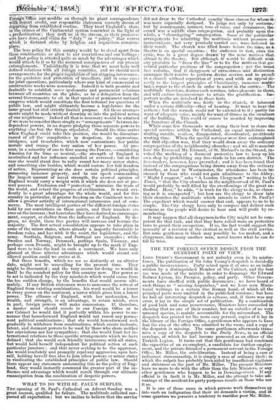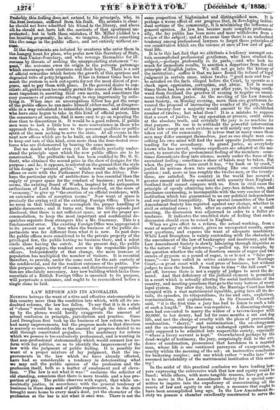THE NEW FOREIGN OFFICE DESIGN FROM THE GUERNSEY POINT OF
VIEW.
LORD DERBY'S Government is not unlucky even in its misfor- tunes. The publication of Sir John Young's despatch is decidedly a public inconvenience. Party seized upon it at once as an indis- cretion by a distinguished Member of the Cabinet, and the best use was made of the mistake in order to disparage Sir Edward Bulwer Lytton, his Premier, policy, and party. Other Govern- ments have shuffled with public documents ; we have heard of such things as "missing despatches," and we have seen Minis- terial writings in a certain fine imam hand, ef which all the principal parts were omitted in the published versions ; but here we had an interesting despatch in extenso, and, if there was any error, it lay in the simple act of publication. By a combination of good luck and some perseverance, Ministers have succeeded in showing that no one of their number, but an outsider of no very unusual species, is mainly accountable for the misconduct. The despatch was printed for the more easy perusal, copies of it lay in the library of the Foreign Office, a gentleman who appears to have had the run of the office was admitted to the room, and a copy of the despatch is missing. The same gentleman afterwards trans- mits a copy of the despatch to the Daily News, in an official envelope, of which he had become possessed as an officer of the Turkish Legion. It turns out that this gentleman had combined the capacities of an ex-employe, a candidate for further employ- ment, and the private friend of a permanent servant in the Foreign Office, Mr. Miller, the sub-librarian. Instead of being a case of indiscreet statesmanship, it is simply a case of ordinary theft; in which the culprit has probably been aided by insufficient vigilance and strictness on the part of Mr. Miller. The present Ministers have no more to do with the affair than the late Ministers, or any other gentlemen who happen to be in Downing-street. If any official is in fault it is Mr. Miller, and the attempt to take ad-- vantage of the accident for party purposes recoils on those who use it so.
It is one of those eases in which persons work themselves up into such an indignation that their ire demands a victim, and III some quarters we perceive a tendency to sacrifice poor Mr. Miller.
Alm feeling does not extend to his principals who, thatiriOnetanee, auffered from his fault. Ms mistake is cl ear : he should not have admitted his friend. to the library, and above allhe.sheald net have left the -contents of that apartment un- Protected; :but in both thesemistakes, if Mr. Miller yielded to a too trusting propensity, he also, we imagine, followed something like the image in the public offices, and not entirely without ex- .
If the departments are infested by creatures who enter them in the hungix hunt /or place, wheipester now this Secretary of State, now that,Under-Secretary, and wile revenge themselves for ill- success by threats of making the nnappreciating etatefinnan "re- pent," the nuisance owes its origin to the perverse patronage which encourages such creatures and their hopes. There is a sort of official cowardice which fosters the growth of this spurious and degraded tribe of petty brigands. It has in former times been too
much the custom. to seek outagents fonnot the most direet of pur- poses, and. to pay them with place. In.the generalaesire to con- ciliate all,pnblicraen.too readily pernathe access of those who are most impnamt in asserting . their own merits, and Sometimes the easy possessors of patronage attempt to stop importunity by satis- fying it When once an unscrupulous fellow has got the range of-the public officea he caamake himself either useful, or disagree- able ins, way calculated to intimidate his patrons, and statesmen who have once begun to take in this kind of official poison, like the oonsinners of arsenic, find it more easy to go on repeating the dose than to discontinue it. It would be a good reform, if public, men were to look a little less to mere convenience in those who approach them, a little more to the personal qualities or public spirit of the men seeking to serve the state. At all events in the next new offices which are to be built, an attempt should be made to keep out rats of this kind, even more than the four-footed crea- tures who are dishonoured by bearing the same name. But we doubt whether even yet the officials perfectly under-
stand the principle upon which the new public offices are to be constructed. The profitable task has been confided to Mr. G. G. Seott, who obtained the second prize in the show of designs for the purpose ; and he, it appears, is selected on the ground that the style of his design is "pointed gothic," which would make the public offices en suite with the Parliament Palace and the Abbey. Per- haps the particular style of architecture is less essential than the supply of proper space for the conduct of business ; yet here, it seems, the existing Board of Works, inspired by the antiquarian enthusiasm of Lord John Manners, has resolved, on the score of "economy," to give up "the erection of an official residence, with an extensive suite of reception rooms." Now want of space is precisely the crying evil at the existing Foreign Office. There is no room in that building to accomplish the proper handling of public documents ; and it turns out, from the little episode just disclosed, that there is not sufficient space, or not the proper ac- commodation, to keep the most important and confidential de- spatches separate from strangers like a Mr. Guernsey. This is a fundamental error. The existing Foreign Office was appropriated to its present use at a time when the business of the public de- partments was far different from what it is now. In past days the pall° offices were considered to be the private property of the privileged few, the public having no business there, and a select circle alone having the entrée. At the present day, the public expects, and enjoys, the readiest access to the responsible public officers. Independently of that change, the mere increase of population has multiplied the number of visitors. It is essential therefore, to provide, under the same roof, for the safe custody of the confidential, and for the readiest entrance of the public. For this purpose space, variety of rooms, and distinctness of appropria- tion are absolutely necessary. Any new building which lacks those essentials of a British Foreign Office is unsuited to its purpose, will perpetuate a nuisance, and ought to be reconsidered before a single stone be laid.



































 Previous page
Previous page